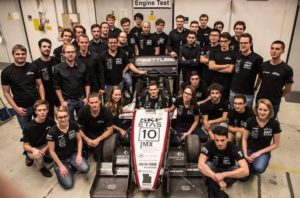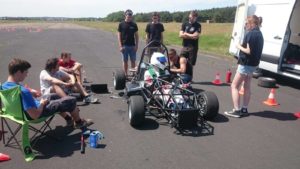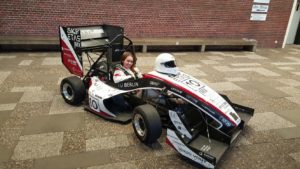Introducing Julia Baldyga
Do you know where Poland is? It is where Robert Kubica comes from, but also where I come from. My parents are smart people who decided it will be a great investment in my future to send me to a German university. It seems to be paying off, however, my path is way rockier that you might expect. There is a joke in the Eastern Europe; there are three career options for a child: a doctor, a lawyer, or a disgrace to the family. Well, I’m the disgrace to the family – I went to study electrical engineering. I barely turned 18 and was moving out of the house to live in a foreign country, leaving my family, friends and my world as I knew it behind. It was exciting, but it was a huge challenge.
The adventure seeker as I am, I studied hard and in my free time indulged into travelling (do you see where it’s going?). I went on to spend an exchange year in Australia, to improve my English, develop personally independent of family influence and travel the southern hemisphere. I came back to Berlin and started working in an automotive laboratory – I came across a job ad at my uni after an unsuccessful 3-month internship in an unrelated field (light technology). For a long time I did not have a clear idea what I could do for work after my studies. I liked my new workplace. It was the first small break through. I thought to myself: “Cars… Why didn’t I think about cars.” Cars have always been present in my life because my father is passionate about them, but there was no strong automotive industry (no R&D, mostly licensed production) as such in Poland around 2000-2010. Also, growing up in a small town, you don’t know about too many jobs that you do not see (like a doctor, hairdresser, cashier, teacher, architect, etc.). The engineering jobs exist mostly in the industry areas and an internship programme for high schoolers is basically nonexistent.

October 2015, start of the season. I’m right behind the left front wheel of the car (with glasses). The girl on the other side of the car was in the engine department, one amazing dedicated personality with a great sense of humour. The girl on the edge of the group on my side founded a network called Formula Student Ladies, which connected the girls in German FS teams. I didn’t grasp the idea back then – you know, it’s easier to fit in when you’re “one of the boys”. Only two years later I got it how important it is that women support other women.
Soon afterwards, in October 2015, I joined my university’s Formula Student Team – FaSTTUBe. I saw my uni colleague casually tweaking the wire harness of a little race car on his laptop in one of the lectures, I spoke to him and found it really cool to see the theoretical knowledge in use. The season was just starting, the team was searching for new members and the meet-up was a week later.
That was the main break through. It turned out to be the most exciting project I have ever done. I started with optimizing the driver’s interface of the steering wheel’s display, then, as some members left (it is an issue in FS teams), as a team of two I took over the design and manufacturing of the wire harness. On and on and through helping in different areas like suspension, engine, testing, sponsoring I got a beautiful insight in how a race car is designed and built in front of my eyes. I focused on and learnt the sensors and actuators in the car, its technical bus systems, functionality of the ECUs, signals circulating between them and event data processing and analysis. I also took care of electronic parts storing, ordering and sponsoring agreements.
I was always taught to give 100% at work and only then had I an opportunity to really show it. However, not everyone does it. There are commitment issues in the team. Be prepared for that. But if you use it – it might be your biggest chance to learn, not only the technical stuff but the teamwork just the same, maybe it’s even more important. If you can, go check out every department of your team – you’ll never have a better opportunity to look at other disciplines because in real companies everything is confidential. If you do electronics – go visit your friends in suspension. If you do aerodynamics – go have a look what’s happening in the engine test bench. Unless, of course, you know from the very beginning what you want to do and who you want to be.
Don’t be scared to come up with your own ideas (but be realistic). If you think something might work better in another way, don’t be scared to talk about it to your department leader or team leader even. New ideas are welcome, you don’t have to be obedient as much as you need to be creative and think ahead. That’s what I wish somebody had told me. And try to be involved without having too many other duties to focus just on the project (like a job, uni courses, etc), otherwise you’re going to have a difficult time without further. What you get in return is immeasurable: the experience – maybe in technology, maybe in leadership, maybe in business and management, maybe in teamwork, maybe in some pre-stage to motorsport. Then there’s the contacts in the industry. And this amazing freedom – in no place in the future will you ever be able to let your imagination roam free to improve the car and take such real impact on the real car’s performance. No student’s job at a company can replace that. I left FaSTTUBe at the end of the season because being involved full time I could not study or work. But that’s when I knew I wanted to work in the automotive industry.

July 2016, a testing session. I don’t look especially helpful. But here are days in Formula Student life when nobody really knows why the car’s broken down again and how to fix it in 24 hours (before the next session).
I graduated after writing my bachelor’s thesis on the automation of a car’s powertrain. I proceeded to do my master’s in Automotive Systems instead of pure Electrical Engineering because it let me learn more about the automotive engineering and have a better overview of car’s mechatronics. I started working in a big company part-time.
As much as I loved my new job in the research and development, it just seemed not to resonate with me. I would have never become an engineer had I known you spend your entire time in the office. I remember loving Formula Student because of the direct closeness of the real car and the pace of development. In about 9 months a working car emerges, your hands are constantly dirty, you see the results of your engineering ideas not later than in a few weeks. Then there’s the atmosphere: you know each and every team member (you love some, you hate some, or even love and hate one person at the same time) and gossip about other teams and their designs as a part of healthy competition.
Anyway, I used to say: if you’re not sure what you want to do, make sure you know what you don’t want to do. Try things out as long as you’re young or as long as you’re a student. Well, so I tried the position in the professional automotive industry. The problem is: development cycles take years – years to see the result of your action. The bigger picture, a car, is mostly an abstraction. I absolutely admire people who work this way, it requires a lot of hard work, self-discipline, talent and love for detail and science. However, I am used to operating on a much higher rate. I thrive on teamwork and enjoy being surrounded by similar minded people to work with instead of spending my working hours in solitary of the office. The anonymity of the work colleagues can too sometimes an issue. I’m also hooked on travelling.

November 2015. Since I joined the team I decided to take as much as I can and volunteered to do basically anything: changing wheels, visiting sponsors, installing or repairing machines in the workshop, car testing, even… posing as a driver in the last year’s vehicle. I never actually drove it, but I know it’s not as easy as it seems – the steering forces are crazy: the steering wheel is small so you need to be quite strong.
I genuinely didn’t know I could work as an engineer in a race team, it’s quite an unpopular path to follow in Germany and an unknown in Poland. We don’t even have a translation for Data Engineer or a Race Engineer. I found out about industrial student placements in Formula 1 last summer – I applied and obviously didn’t get in; however, it opened my eyes on the opportunities I hadn’t yet checked out. I received a pamphlet from one of the teams describing the positions in a race team.
Half a year and a zillion mails and phone calls later I’m becoming an intern in data engineering at Van Amersfoort Racing, a well-established F3 race team. I tried not to take “no” (or a lack of any response) personally when applying. I was aware it is a peculiar small world and that it won’t be easy to get in. Plot twist: I am going to be volunteering. But I think it’s a good way to start. My two roles models are Romy Meyer, Data Engineer at Triple Eight and Bernadette Collins, Senior Strategist at Force India. Bernadette said in an interview: “Make sure that what you’re changing to is what you really want to do. It’s very easy to look at someone else’s role and think that it’s enjoyable or very easy to do. Until you volunteer some time to do it you won’t know if it’s something you want to do.” And I couldn’t express it better myself. If you think about working in F1 but do not want to go volunteer at a local kart track, any lower Formula team, get your hands dirty at the Formula Student – please revise your dream.
Getting into motorsport is not easy. It has been little less than a year now since I started planning to get in. In the middle of 2018, I knew I had 9 months of my studies to do before I could leave for an internship. My advice is: plan well ahead. Do things well ahead. If you can do an exam earlier, do it. You don’t know if there’s an opportunity or a problem coming up later, so it’s better to do your duties earlier. If you hadn’t learned just that at the Formula Student, then, unfortunately, you had learned nothing.
Also, I think it’s true what they say: try and follow a path that you like, not somebody else – and take the opportunities that will bring you closer to your dream, not those that might look good on your CV. I was laughed at by a lot of engineers at my workplace, because I was leaving my neat position in the well-paying corporation and I was frowned upon when I said I want to work trackside and not in the office. But I think that’s where I will be able to see measurable effects of my actions, where my teamwork skills may come in handy and where no two days are similar. Because motorsport is a sport, not just a job.
I think the most beautiful thing might be the attitude of the people. Their dedication really sets them apart from typical work environment. Everyone who’s there went out of their way to get there and won’t complain about longer working hours, stress or just having to work. They’re not in motorsports because of the money, or because they have to. It’s far from glamourous. It takes up a bigger part of your life. I think the casual complaining of some of my colleagues in the corporate job might have made me think about an alternative career path. I love what I study and work – and I want to surround myself with people who are happy to be working their job too.
